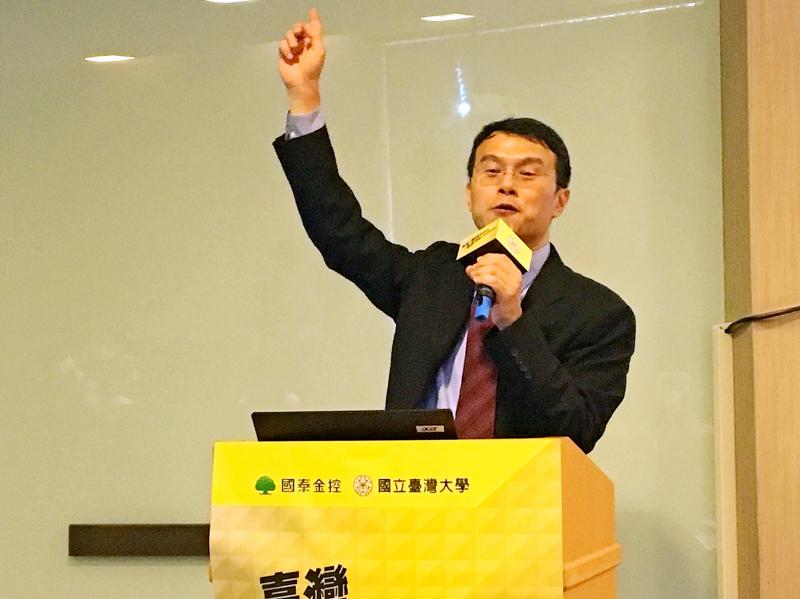Cathay Financial Holding Co (國泰金控) yesterday lowered its forecast for the nation’s GDP growth for a second time this year to 1.7 percent, from the 1.8 percent it predicted in June, due to weaker-than-expected economic performance in the first half of the year.
“The local economy grew slower than our expectations at 1 percent in the first six months, with an annual gain of 0.78 percent, which could be attributed to worse-than-expected private consumption,” said Hsu Chih-chiang (徐之強), an economics professor at National Central University who heads a research team commissioned by Cathay Financial.
Nevertheless, Cathay Financial’s latest forecast is still more optimistic than the Directorate-General of Budget, Accounting and Statistics’ (DGBAS) prediction of 1.56 percent growth and the central bank’s forecast of a 1.6 percent expansion, as the company is more upbeat about exports and private consumption, Hsu said.

Photo: Allen Wu, Taipei Times
“We do not think exports will be as sluggish as the government has forecast, as local manufactures are smart enough to ship their goods in advance of any ban that might result from US-China trade tensions,” he said.
For example, the nation’s exports last month hit a record US$31.17 billion, as some suppliers of Huawei Technologies Co (華為) shipped their products before Washington’s sanctions on the Chinese company took effect on Tuesday last week, he added.
“Exports likely hit US$28 billion this month, which would raise the third quarter’s total exports to US$88 billion, beyond the government’s prediction of US$84 billion,” Hsu said.
In the second half of this year, private consumption is expected to stage a rally strong enough to offset a 3.26 percent decline in the first half, which would result in a 0.72 percent dip for the whole year, milder than the DGBAS’ prediction of 1.44 percent, he said.
Cathay Financial expects the economy to recover next year with annual growth of 2.9 percent, which would be higher than the nation’s average GDP growth of 2.7 percent over the past 10 years, Hsu said.
That is more conservative than the DGBAS’ prediction of 3.92 percent growth, as Cathay Financial thinks that US-China trade tensions and Washington’s new sanctions on Chinese firms are likely to disrupt global supply chains, which local companies could fall prey to, he added.
Taiwanese companies would have to find new customers if their relationship with Chinese companies change, he said, adding that firms might also need to adopt new production models due to changing global supply chains.
“While the government has predicted a V-shaped recovery in the economy, Cathay Financial tends to expect a swoosh-shaped rebound, which means that it would take a long while for the economy to get back to the pre-pandemic situation due to uncertainty,” Hsu said.

UNCERTAINTY: Innolux activated a stringent supply chain management mechanism, as it did during the COVID-19 pandemic, to ensure optimal inventory levels for customers Flat-panel display makers AUO Corp (友達) and Innolux Corp (群創) yesterday said that about 12 to 20 percent of their display business is at risk of potential US tariffs and that they would relocate production or shipment destinations to mitigate the levies’ effects. US tariffs would have a direct impact of US$200 million on AUO’s revenue, company chairman Paul Peng (彭雙浪) told reporters on the sidelines of the Touch Taiwan trade show in Taipei yesterday. That would make up about 12 percent of the company’s overall revenue. To cope with the tariff uncertainty, AUO plans to allocate its production to manufacturing facilities in

Taiwan will prioritize the development of silicon photonics by taking advantage of its strength in the semiconductor industry to build another shield to protect the local economy, National Development Council (NDC) Minister Paul Liu (劉鏡清) said yesterday. Speaking at a meeting of the legislature’s Economics Committee, Liu said Taiwan already has the artificial intelligence (AI) industry as a shield, after the semiconductor industry, to safeguard the country, and is looking at new unique fields to build more economic shields. While Taiwan will further strengthen its existing shields, over the longer term, the country is determined to focus on such potential segments as

TAKING STOCK: A Taiwanese cookware firm in Vietnam urged customers to assess inventory or place orders early so shipments can reach the US while tariffs are paused Taiwanese businesses in Vietnam are exploring alternatives after the White House imposed a 46 percent import duty on Vietnamese goods, following US President Donald Trump’s announcement of “reciprocal” tariffs on the US’ trading partners. Lo Shih-liang (羅世良), chairman of Brico Industry Co (裕茂工業), a Taiwanese company that manufactures cast iron cookware and stove components in Vietnam, said that more than 40 percent of his business was tied to the US market, describing the constant US policy shifts as an emotional roller coaster. “I work during the day and stay up all night watching the news. I’ve been following US news until 3am

COLLABORATION: Given Taiwan’s key position in global supply chains, the US firm is discussing strategies with local partners and clients to deal with global uncertainties Advanced Micro Devices Inc (AMD) yesterday said it is meeting with local ecosystem partners, including Taiwan Semiconductor Manufacturing Co (TSMC, 台積電), to discuss strategies, including long-term manufacturing, to navigate uncertainties such as US tariffs, as Taiwan occupies an important position in global supply chains. AMD chief executive officer Lisa Su (蘇姿丰) told reporters that Taiwan is an important part of the chip designer’s ecosystem and she is discussing with partners and customers in Taiwan to forge strong collaborations on different areas during this critical period. AMD has just become the first artificial-intelligence (AI) server chip customer of TSMC to utilize its advanced